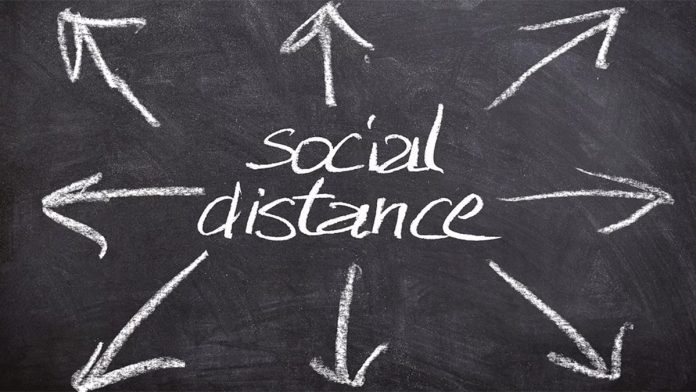Of the many health-related topics circulating since the start of the new coronavirus outbreak roughly four weeks ago, social distancing has been at the forefront. Doctors and health professionals have been vocal about the need for everyone to play a part in social distancing to staunch the spread of the virus and “flatten the curve.”
On April 8, Philadelphia Health Commissioner Tom Farley announced 505 newly confirmed cases of the virus in Philadelphia, yielding a total of 4,777 total known cases in the city. “Today the news is a little bit better — we are seeing a slowing in the growth of cases of coronavirus here in the city,” Farley said in Wednesday’s City Hall COVID-19 brief. “The daily numbers, if we’re successful, will start to fall.” However, he cautioned that the slowing may not necessarily continue.
“The main importance in social distancing right now is to make sure that you protect yourself from being in a situation that may place you [at] risk of being adequately cared for in a medical establishment,” said Dr. Luis Montaner, director of the HIV-1 Immunopathogenesis Laboratory at Wistar’s Vaccine and Immunotherapy Center. “If you happen to be elderly and you are in need of a ventilator, and all of a sudden, you’re in the bulk of people trying to get access to a ventilator, the medical establishment [may not] be able to provide it.”
Montaner told PGN that he believes that the month of April will be important in terms of the trajectory of the virus in Philadelphia.
“The question is, are we going to take this opportunity to flatten the rise to make it different than New York, or are we basically going to follow a trajectory that keeps moving up,” Montaner asked rhetorically. “I think we still have the potential to change that trajectory. That means not just people that are infected need to be staying home, but people that are not infected need to stay home. If you’re not infected and you’re out, you’re at risk of becoming part of that curve, and if you are infected, you’re at risk of amplifying that curve.”
In recent days, the Centers for Disease Control and Prevention recommends that individuals wear masks when they go out in public.
“The evidence supports that if you are infected, you’re less likely to transmit it if you have a mask,” Montaner explained. “If someone’s infected and not wearing a mask, the fact that you’re wearing a mask is not protective. If you want to communicate to someone else that they can be comfortable in your presence, then you would have a mask.”
For members of the LGBTQ+ community, social distancing is paramount; higher percentages of LGBTQ folks are living with chronic diseases compared to their straight and cisgender peers.
The CDC reported that gay and bisexual men account for roughly 10% of new Hepatitis A and 20% of new Hepatitis B infections in the U.S. The CDC also reported that in 2017, adult and adolescent gay and bisexual men accounted for 27,000 of the 38,739 new HIV diagnoses in the U.S. From 2009-2014, 2,351 transgender individuals were diagnosed with HIV in the U.S, according to the CDC. LGBTQ individuals also have higher rates of smoking than members of the general population, which increases the risk of lung disease, according to a physician at Mazzoni Center.
“All these higher rates of comorbidity, it’s just one of the things the epidemic has shown the underlying problems in our system of providing care and support for people in different communities,” said Coleman Terrell, director of the AIDS Activities Coordinating Office (AACO) in the Philadelphia Department of Health. “In terms of the health of LGBT communities, social distancing is really important because there are these higher comorbidities.”
Although people living with HIV are at no greater risk of contracting the new coronavirus if their CD4 counts are normal, there are other risk factors. “People living with HIV tend to be older, and so are a higher risk group,” Terrell said. “We want to protect all the members of our communities, so practicing social distancing, washing our hands, keeping six feet away, staying at home — are really important.
Terrell recommended local health resources including the City of Philadelphia’s Sex During COVID-19 guidelines and the AACO health line, which provides access to medical care, case management and referrals to the HIV prevention medication PrEP. Health Center 1, the city of Philadelphia’s walk-in clinic for STD testing and treatment, is still operational, but patients must call in advance, Terrell said. Philadelphia Health Department staff can order home HIV test kits and mail them to individuals via Philly Keep on Loving.
In addition to stocking up on supplies and ensuring access to proper medications and treatments, it is also important to consider alternative ways of being intimate.
“So often during this time, we often think of intimacy as physical intimacy and sex and sexuality, and it’s times like this where we’re really challenged to expand our definition of what intimacy is,” said Jacob Glickman, a psychotherapist for Emerge Wellness, an LGBTQ-owned and operated therapy practice in Philadelphia. Glickman specializes in mental healthcare for transgender and other LGBTQ community members, and has a “sex-positive, kink-positive and poly-aware practice.”
“For sexual partners, whether that be working on dirty talk, finding a video platform where you can video chat each other, mutual masturbation or using toys together, there are still ways of maintaining intimacy even if physical proximity, unfortunately, can’t be part of your relationship at this moment.”
Greater Philadelphia Coronavirus Helpline: 800-722-7112. For the Health Information, Helpline, access to HIV medical care, HIV case management, referrals to PrEP or assistance with accessing services funded by AACO, call 215-985-2437. To reach Philadelphia’s Health Center 1, call 215-685-6575 or 215-685-6571.
Ask questions, get answers about COVID-19
